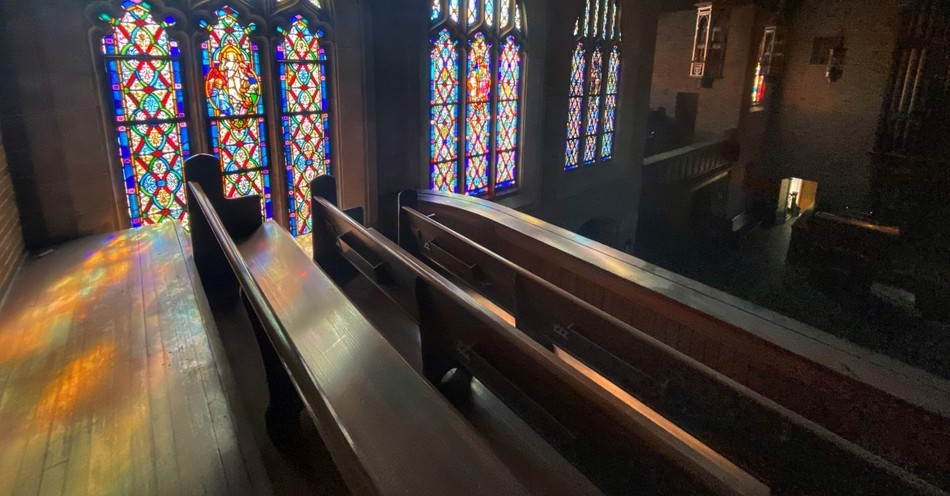Ecclesiology is the study of churches, especially church building and decoration, but also the theological study of the nature and structure of the Christian Church.
The word ecclesiology began as a word for buildings but is usually used today for groups of people. It’s also a word that all Christians should know.
What Does the Word Ecclesiology Mean?
The word ecclesiology means the study of the church.
When it was first used in the 1840s, a group of architects used it to refer to the study of the design of churches.
Later, in the early 1900s, biblical scholars began using ecclesiology to discuss the development of church doctrines. That is what ecclesiology means today. Ecclesiology is important because it helps believers figure out where they stand on different doctrines within the church.
Ecclesiology in Architecture
In its original context, ecclesiology was invented for a movement in England where people wanted to study how church architecture developed over time. Architecture students of the time were particularly fascinated by Gothic architecture, the dominant building style throughout the medieval period. The Cambridge Society redesigned the architecture of a typical Anglican Church to reflect the older churches more. They encouraged the architects who designed churches to consider how the church’s layout affects the worship within the building.
The term ecclesiology has not been used to describe this field of architecture since the early 1900s.
Ecclesiology in Theology Studies
In systematic theology, ecclesiology considers who is in the church. Systematic theologians attempt to take the whole of scripture and make it applicable to life. So, ecclesiologists seek to take the whole of scripture and understand what the Bible says about how churches should be structured, who should be ordained, and how the church views the Sacraments.
There are many different views within ecclesiology on how to deal with these questions.
Debates Within Ecclesiology
The starting point of ecclesiology is, “Who is the church?” This question is foundational to the rest of the field of study because providing a clear definition will determine what follows.
Augustus Hopkins Strong, a systematic theologian in the late nineteenth and early twentieth century, gives the following answer to this question:
“The church of Christ, in its largest signification, is the whole company of regenerate persons in all times and ages, in heaven and on earth. (Mat. 16:18; Eph. 1:22, 23; 3:10; 5:24, 25; Col. 1:18; Heb. 12:23). In this sense, the church is identical with the spiritual kingdom of God; both signify that redeemed humanity in which God in Christ exercises actual spiritual dominion (John 3:3, 5).”
From this quotation, it is clear that Strong aligns himself with the Protestant Reformers—he stresses people’s salvation is based in Christ, not tying it to a particular church figure or authority structure. Reformation theologians like Martin Luther and John Calvin developed an ecclesiology that didn’t rely on the Catholic Church’s seal of approval.
Before and after the Reformation, Catholic ecclesiologists maintained that there was no salvation outside the Catholic church. In the third century, they applied Cyprian’s words about Christ’s exclusivity to the Catholic Church. This pattern continued until the Second Vatican Council, updating Catholic ecclesiology to say people from all faiths may be saved.
Another key debate encompassing all of Christendom is ecumenicalism, the idea that the church should become one again. It advocates for Churches and congregations to work together and overlook their differences because they worship the same God and his son Jesus. This can create problems when some denominations’ founding documents explicitly condemn other denominations (i.e., the Westminster Confession). Before the Second Vatican Council, Catholic dogma said no Catholic might participate in any non-Catholic religious function. This clause was removed as the Catholic Church moved toward a more ecumenical position.
Another big debate within Protestant ecclesiology is that of church government. This is one of the primary divisions between Baptists and other denominations. Churches from the “radical” Reformation tradition follow a congregational church government structure—meaning individual churches have the authority to do things independently, with church members voting on matters. Churches following congregation structure often fit into denominations with minimal oversight, such as the Southern Baptist Convention.
Meanwhile, churches within the magisterial tradition have a more top-down church government structure. These include the Church of England (also known as the Anglican Church), Lutheran, Presbyterian, and Reformed Churches. Each has significant differences, but they all have a more top-down approach where a governing body oversees the denominations.
Another debate in modern ecclesiology is who is fit to lead the church. Many denominations have ordained women as pastors and elders in their churches. Many churches view this as a violation of explicit command in scripture.
Why Does Ecclesiology Matter Today?
What we believe about the church can impact what we believe about God. All orthodox Christian theologians (those who hold to the historic Christian faith) believe that there will be differences in church practices, yet people with different views of church government or baptism are still saved and brought into God’s kingdom.
Cults or false teachers typically don’t hold to these ideas. They believe they are the “one true Church” and that there is salvation nowhere else. Recognizing when these false claims are made can help believers stay true to what Paul says in Romans 10:9-10:
“If you confess with your mouth that Jesus Christ is Lord, and believe in your heart that God raised him from the dead, you will be saved. For with the heart one believes and is justified, and with the mouth one confesses and is saved.”
Another reason ecclesiology matters today is that it helps us find unity in the church. Most Christians agree that the church is very divided these days. That is not a good thing. Rediscovering ecclesiology’s importance can help us live out the prayer Jesus prayed for us in John 17. Understanding the differences between denominations and how they developed can help us recognize the essentials we agree on.
Ecclesiology also helps believers avoid the “I love Jesus, but I can’t stand the church” mentality. It shows that the church is vital for believers to experience fellowship. Our relationship with God is both individual and corporate. Understanding ecclesiology helps us live out Hebrews 10:24-25 better because we are not “neglecting to meet together, as some are in the habit of doing.”
Developing our ecclesiology will help us play a more vital role in our church communities because it enables us to join a team to reach the world around us.
Ecclesiology can also help believers figure out where they stand on different doctrines. Understanding what denominations believe can help them find a church they agree with and can function well within. In doing so, they can find people to work with in reaching their neighbors with the Gospel.
What Are Some Great Resources for Learning about Ecclesiology?
Gregg Allison’s The Church: An Introduction is an approachable and modern introduction to ecclesiology. This resource goes through the basic ideas of ecclesiology.
9marks.org is a ministry that provides resources on ecclesiology from a reformed perspective. Their website has many great resources about ecclesiology.
Four Views on the Church’s Mission, part of Zondervan’s Counterpoints series, provides a discussion between several people on the function of the church’s mission, a key part of ecclesiology.
Another Counterpoints book, Who Runs the Church?: 4 Views on Church Government, considers different views on how the church should be run.
Strong’s discussion of ecclesiology, mentioned earlier, is “The Constitution of the Church, or Church Polity,” the first chapter of his book Systematic Theology. This starts a whole section of his book devoted to ecclesiology. It is a densely worded but free read and a great resource to go in-depth on what the totality of scripture says on ecclesiology.
Photo Credit: Getty Images/Michael Dean Shelton
Ben Reichert works with college students in New Zealand. He graduated from Iowa State in 2019 with degrees in Bioinformatics and Computational Biology, and agronomy. He is passionate about church history, theology, and having people walk with Jesus. When not working or writing you can find him running or hiking in the beautiful New Zealand Bush.
This article is part of our Christian Terms catalog, exploring words and phrases of Christian theology and history. Here are some of our most popular articles covering Christian terms to help your journey of knowledge and faith:
The Full Armor of God
The Meaning of "Selah"
What Is Grace? Bible Definition and Christian Quotes
What is Discernment? Bible Meaning and Importance
What Is Prophecy? Bible Meaning and Examples


.png)
